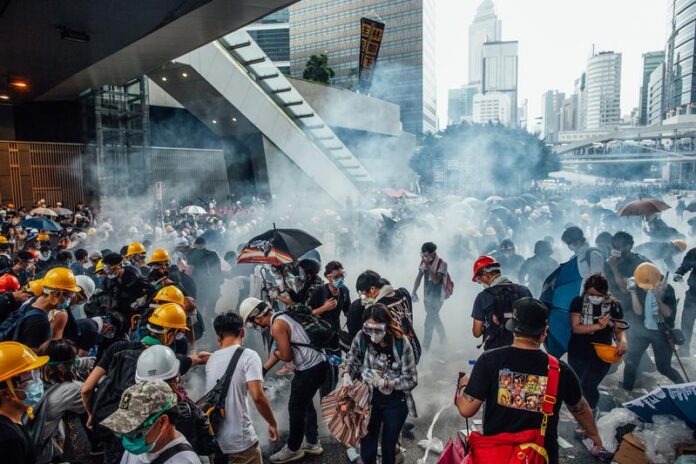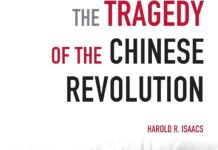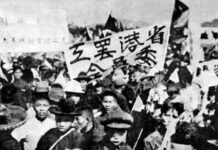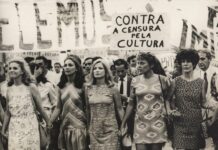The political weaknesses and shortcomings that caused the epic 2019 mass movement to fail
This is a speech delivered by Peter Chan from Hong Kong at a session of the 2024 Marxist School of ISA in China-Hong Kong-Taiwan devoted to the Lessons of Mass Struggle.
Today’s Hong Kong is in a complete counter-revolution. Since the national security law was imposed in 2020, 291 have been arrested, and 112 convicted, that is a 100% conviction rate. This is on top of the 10,000 arrested during the 2019 mass anti-authoritarian movement. Over 3,000 of those have been prosecuted – some receiving 10-year jail sentences.
The vast majority of opposition groups, unions and parties were disbanded, including the largest and most historical unions like PTU and CTU which each had more than 100,000 members. In most cases, the leaders of these organisations who are mostly pro-Western liberals themselves decided to disband – rather than resist. This facilitated the task of counter-revolution. Opposition media and publications were banned or closed down – charged with publishing seditious materials. Hundreds of books including our books are banned.
The new “Article 23” law of 2024 introduces more vague crimes like “stealing state secrets”, “activities that endanger national security” etc. Police can now detain without charge for 14 days, up from 48 hours. The arrested may not be given the right to contact their own lawyer. It means the masses have lost all democratic rights – Hong Kong is now just like in mainland China. There is no longer a right to demonstrate, to organise. The repression is not a temporary phase. It won’t get “better” – this is the new normal unless there is a revolutionary overturn in China.
How did this happen? Hong Kong used to be the only city in China to allow protests, for example, the June 4 vigil. Hong Kong was called the “city of protest” before the 2020 counter-revolution. We revolutionary socialists almost had weekly demos to intervene in, we were able to do open work.
The 2019 movement saw 2 million on the streets, a quarter of the population. The movement lasted over six months, yet it still failed. But we predicted and warned this in advance. Failure was due to three main reasons:
- No linking to working-class demands to oppose capitalism.
- Lack of democratic structures within the movement, which is linked to the lack of real mass workers’ organizations.
- Crucially, the lack of appeal to workers in China to spread the struggle to China.
The root of all three problems is the historical weakness of working-class organisations, part of the legacy of Stalinism-Maoism, which has led to a very low level of political consciousness among the masses in Hong Kong. Stalinism-Maoism damaged the image of “socialism” and turned the former working-class organizations in Hong Kong into arms of the CCP dictatorship, which in the 1980s restored capitalism.
The movement in general is limited to bourgeois democratic rights. The five demands of the 2019 mass movement were OK in themselves, we would support them, but they only focused on very partial rights – mostly against police repression. The movement did not fundamentally challenge the existing system but demanded concessions within that system. This would never be allowed by the CCP dictatorship.
It requires taking power by the working class, and overthrowing the dictatorship and capitalist system – that is a revolutionary movement. In Russia in 1917, democratic demands – “down with the tsar’s dictatorship” were the mighty spark of the revolution. But the Bolsheviks won mass support by linking this to the question of power: “All power to the workers’ soviets” was their No 1 demand. But such a movement did not exist in Hong Kong, the reformist politicians and semi-anarchist “frontline fighters” never linked this to the need for a new power – the overthrow of the capitalist regime. The demands were posed as reforms/concessions within the existing system.
In Hong Kong, workers participated as individuals, not as an organized class. This is despite the fact that dozens of unions were formed during the 2019 movement, and it saw the first political strike in 90 years. These initiatives were seen more as supportive actions to the “main” movement – they didn’t have the ambition for workers to push their own independent working-class anti-capitalist demands. The drive to form unions was at first promoted by bourgeois pan-democrats and localists to win the “trade union” votes in the election committee and functional constituencies of the semi-elected Hong Kong legislature rather than to build struggle organisations for workers to fight the capitalists.
True, there is mass anger in Hong Kong against the “property hegemony” of the big tycoons, but this is not the same as seeing an alternative to capitalism as a whole. Historically, this is partly due to Hong Kong being seen as a success story of capitalism. Crucially also because of the miseducation by the pan-democrats that democracy is only possible with capitalism.
This led to a lack of alternatives, including the fear that the CCP is too powerful and cannot be overthrown. This is partly due to a superficial misunderstanding of the weakness of Chinese mass struggles, which meant that consciousness about how far the struggle could go was trapped within the existing government and system. The slogan “reclaim Hong Kong, revolution of our times” is a reflection of such pro-capitalist consciousness: looking back to a period when capitalism was still on the rise and appealing to a very vague “revolution” – change the government but not the system.
Therefore the movement only called for local concessions: more democracy in Hong Kong, more autonomy, more “Hong Kong”, less CCP. These confused ideas were reinforced by the pan-democrats and localists, who were the most confused of all. Again, consciousness is to “defend” Hong Kong as a city, hoping for “one country two systems” and autonomy to be realised. Accordingly, Hong Kong, and the issues facing its people, are seen as special and unique from the rest of China, and Hong Kong can continue to be the only city with democratic rights under the rule of the CCP dictatorship.
Such political confusion was exacerbated by the rise of localism – initially a reaction to the limitations of the “moderate” pan-democrats – but due to the localists’ racism against Chinese people, drawing the wrong conclusion that the Hong Kong movement should even actively cut ties with the Chinese masses. But the real enemy of the Hong Kong democracy movement is the CCP dictatorship, the Hong Kong government is just a puppet that does what it is told. The deepening social and political crisis in China and mass anger in the mainland, plus the escalation of the imperialist conflict with the US, meant that the CCP could no longer tolerate even the very limited existing democratic rights in Hong Kong, let alone give in to the full demands of the movement. It rightly fears that the democracy movement will spread to China and threaten the CCP dictatorship. It therefore needed to crush the mass struggle and the liberal political groups to gain total control over the city. This was the basis of the CCP’s decision to launch the counter-revolutionary white terror in Hong Kong.
The initial spontaneity of the 2019 movement allowed it to break free from the pen-democrats’ control. Many were disgusted with their betrayals over the last 30 years including in the 2012 and 2014 movements. But while there was a progressive initial side to this anti-party / anti-politician mood, it grew into a powerful anti-organization and anti-leadership mood that worshipped spontaneity and complete decentralisation, preferring anarchist activism and confrontation with police in the mistaken idea that was enough to wear down the state.
A popular idea in the movement was “against the main stage” which means opposing all political organization and leadership including democratic structures for the movement. Another idea was, “brothers climb the mountain on their own”, meaning anyone can contribute to the movement in their own way and all methods are of equal validity – individualism rather than selecting which are the best tactics and methods through mass collective discussion and decision-making. Throughout the movement, we met a lot of youth who may be interested in our ideas, but still saw their individual participation in the frontline as more “important” than any specific politics. Politics was seen as unimportant; people did not want to discuss complex political issues.
They preferred discussing “tactical” issues: when and where to confront the police – the idea of “be water” – which is mistakenly seen as a strength of the Hong Kong movement and was exported to other struggles like Thailand, Burma, Catalonia and BLM in America. People hoped that spontaneous actions and mass demos alone would be able to force the government to give in – but instead, this allowed the ruling class to wait out the movement, to let it exhaust itself and break up.
There were unfortunately no attempts to form mass democratic committees to coordinate and make major decisions for the movement. In the movement, 5 demands were adopted as “official” demands although actually never decided at any representative democratic assembly. As stated, socialists could support all of these demands, but they were not enough. Moreover, pressure developed that it would be “harmful” to raise additional demands because this would cause divisions. These illusions and confusion became a brake stopping the necessary development of an experienced, cohesive organisational structure with clear democratically agreed ideas: a revolutionary party and mass organisations.
What is the role of a Marxist organization in this situation? We do not just sit aside and complain that the movement was not worthy of support due to it not being a perfect “working class” movement – that would be sectarianism. Nor would we simply be cheerleaders and volunteers in the movement, which would be opportunism. Other left groupings in Hong Kong just dissolved in the mood of the movement. They just chanted the same slogans with the masses like “Reclaim Hong Kong”.
Marxists show we are the hardest fighters in such struggles. But we do this as a tightly organised force with a clear socialist view: our slogans, our warnings, and our proposals to strengthen the movement, and overcome its dangerous weaknesses. Naturally, especially at the start, we would be a minority in the movement given the weakness of mass organisations and low-level consciousness at that stage. Therefore, we will have to swim against the current – even the Bolsheviks were a small isolated minority in February 1917 after the fall of the tsar. Our aim would not be hoping to gain a mass audience initially, we aim to reach out to the most advanced layers of the youth and masses, those who drew similar conclusions and lessons with us.
Mass struggles will break out in China inevitably in the coming period, but these will also be very complicated – filled with all sorts of illusions and confusions. We do not fear these complications, but we have to understand and prepare.




